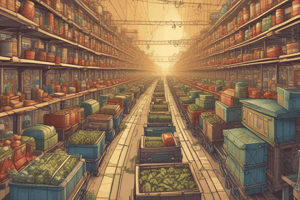Podcast
Questions and Answers
What are the factors of production?
What are the factors of production?
- Land (correct)
- Capital (correct)
- Enterprise (correct)
- Labour (correct)
What is a market system?
What is a market system?
The network of buyers, sellers, and other actors that come together to trade in a given product or service.
What does a command system involve?
What does a command system involve?
Government controls the factors of production and uses them.
What characterizes a traditional economic system?
What characterizes a traditional economic system?
What are the basic economic questions?
What are the basic economic questions?
Who is Adam Smith?
Who is Adam Smith?
Who is Karl Marx?
Who is Karl Marx?
What is demand?
What is demand?
What is the law of demand?
What is the law of demand?
What is a demand schedule?
What is a demand schedule?
What is a demand curve?
What is a demand curve?
What is abnormal demand?
What is abnormal demand?
What is utility in economics?
What is utility in economics?
What is marginal utility?
What is marginal utility?
What is consumer surplus?
What is consumer surplus?
What is Real GDP?
What is Real GDP?
What is accounting profit?
What is accounting profit?
What is total cost?
What is total cost?
What are fixed costs?
What are fixed costs?
What are variable costs?
What are variable costs?
What is the average fixed cost?
What is the average fixed cost?
What is average variable cost?
What is average variable cost?
What is total revenue in economics?
What is total revenue in economics?
What is profit?
What is profit?
What is marginal revenue?
What is marginal revenue?
What is marginal cost?
What is marginal cost?
What does labour intensive refer to?
What does labour intensive refer to?
What does capital intensive refer to?
What does capital intensive refer to?
What is the break-even point?
What is the break-even point?
What are economies of scale?
What are economies of scale?
What is perfect competition?
What is perfect competition?
What is a monopoly?
What is a monopoly?
What is collusion?
What is collusion?
What is a natural monopoly?
What is a natural monopoly?
What is deregulation?
What is deregulation?
What are patents?
What are patents?
What are third party costs?
What are third party costs?
What are externalities?
What are externalities?
What is macroeconomics?
What is macroeconomics?
What is GDP?
What is GDP?
What is the expenditure approach to GDP?
What is the expenditure approach to GDP?
What is inflation?
What is inflation?
What is the Consumer Price Index (CPI)?
What is the Consumer Price Index (CPI)?
What is the Prime Rate?
What is the Prime Rate?
What does tight money mean?
What does tight money mean?
What does easy money refer to?
What does easy money refer to?
What is the Bank Rate?
What is the Bank Rate?
Flashcards are hidden until you start studying
Study Notes
Key Concepts in Economics
-
Factors of Production: Essential resources include LAND, LABOUR, CAPITAL, and ENTERPRISE for producing goods and services.
-
Market System: A network for trading involving buyers, sellers, and other participants for specific products or services.
-
Command System: Economic structure where the government oversees and controls the factors of production and directs the distribution of goods and services.
-
Traditional System: An economic framework influenced by customs and beliefs, dictating the types of goods and services produced in the economy.
Economic Questions and Theorists
-
Basic Economic Questions: Core queries include what to produce, how to produce, how much to produce, and for whom to produce.
-
Adam Smith: Associated with the concept of the "invisible hand" promoting the Free Market System.
-
Karl Marx: Key figure for theories on the command system and his work, "Das Kapital."
Demand and Utility
-
Demand: The quantity of a good or service consumers are willing to purchase at various price levels within a time frame.
-
Law of Demand: Indicates that quantity demanded inversely relates to price, assuming ceteris paribus (other conditions remain constant).
-
Demand Schedule: A representation of the relationship between price and quantity demanded for a specific product.
-
Demand Curve: Graphical representation with price on the vertical axis and quantity demanded on the horizontal axis.
-
Abnormal Demand: Significant demand fluctuations due to promotions, price drops, or substitutes.
-
Utility: Measures consumer preferences for various goods and services; marginal utility refers to the added satisfaction from one more unit consumed.
Profit and Cost Concepts
-
Accounting Profit: The total earnings of a company after expenses are deducted.
-
Total Cost: Sum of all expenses for achieving a certain output level, calculated as Variable Cost + Fixed Cost.
-
Fixed Cost: Expenditures that do not change with production levels during a relevant period.
-
Variable Cost: Costs that fluctuate with production volume.
-
Total Revenue: Represents total sales revenue for a firm based on output quantity.
-
Profit: The remaining income of a business after accounting for all costs.
-
Marginal Revenue: The additional revenue generated from selling one more unit.
-
Marginal Cost: The cost incurred from producing one additional unit of a good.
Market Structures
-
Perfect Competition: A market structure where no single participant can influence the price of a homogeneous product.
-
Monopoly: A market scenario where a single seller dominates the entire market for a product.
-
Natural Monopoly: Certain products with high fixed costs are more efficiently produced by a single producer than by multiple smaller firms.
Economic Measures and Phenomena
-
Real GDP: Adjusted measure of economic output that accounts for price changes.
-
Macroeconomics: Study of the economy as a whole, focusing on large-scale economic factors.
-
GDP: Represents the monetary value of all finished goods and services produced within a country's borders during a specific time.
Regulations and Externalities
-
Deregulation: The reduction or elimination of government regulations within an economic context.
-
Patents: Exclusive rights granted to inventors for a limited period in exchange for detailed public disclosure of inventions.
-
Third Party Costs: Negative externalities that impose costs on parties not directly involved in the economic transaction.
-
Externalities: Costs or benefits that impact individuals not participating in the economic activity.
Economic Indicators
-
Inflation: Sustained increase in the overall price levels of goods and services across an economy.
-
Consumer Price Index (CPI): Indicator showing the rate of price changes experienced by consumers.
Monetary Concepts
-
Bank of Canada: Country's central bank responsible for regulating the money supply and interest rates.
-
Prime Rate: The lowest interest rate available to borrowers, reflecting the cost of money.
-
Tight Money: Availability of funds at higher interest rates, indicating restrictive monetary policy.
-
Easy Money: Refers to favorable conditions for acquiring loans or financing, typically associated with an increased money supply.
-
Bank Rate: Interest rate charged by the central bank to commercial banks for loans.
Studying That Suits You
Use AI to generate personalized quizzes and flashcards to suit your learning preferences.




